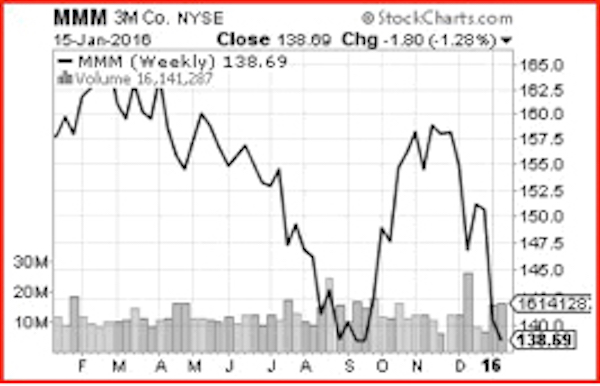Keeping Your Head in a Plummeting Market
The six-year bull market was great. Now that a bear looms, it will be the buyers who end up making the big money. Here’s why I like 3M Company.

Profit and prosper with the best of Kiplinger's advice on investing, taxes, retirement, personal finance and much more. Delivered daily. Enter your email in the box and click Sign Me Up.
You are now subscribed
Your newsletter sign-up was successful
Want to add more newsletters?

Delivered daily
Kiplinger Today
Profit and prosper with the best of Kiplinger's advice on investing, taxes, retirement, personal finance and much more delivered daily. Smart money moves start here.

Sent five days a week
Kiplinger A Step Ahead
Get practical help to make better financial decisions in your everyday life, from spending to savings on top deals.

Delivered daily
Kiplinger Closing Bell
Get today's biggest financial and investing headlines delivered to your inbox every day the U.S. stock market is open.

Sent twice a week
Kiplinger Adviser Intel
Financial pros across the country share best practices and fresh tactics to preserve and grow your wealth.

Delivered weekly
Kiplinger Tax Tips
Trim your federal and state tax bills with practical tax-planning and tax-cutting strategies.

Sent twice a week
Kiplinger Retirement Tips
Your twice-a-week guide to planning and enjoying a financially secure and richly rewarding retirement

Sent bimonthly.
Kiplinger Adviser Angle
Insights for advisers, wealth managers and other financial professionals.

Sent twice a week
Kiplinger Investing Weekly
Your twice-a-week roundup of promising stocks, funds, companies and industries you should consider, ones you should avoid, and why.

Sent weekly for six weeks
Kiplinger Invest for Retirement
Your step-by-step six-part series on how to invest for retirement, from devising a successful strategy to exactly which investments to choose.
The way the year has begun in the stock market, you'd think the world was coming to an end. On a percentage basis, the first two weeks of trading were the worst ever for the Dow Jones Industrial Average. The price of crude oil has plunged below $30 per barrel, and there is no shortage of speculation about the imminent collapse of one company or another. Every gloomy headline feeds the selling frenzy.
There’s no doubt that a bear market (defined as a market decline of 20% or more) is a growing possibility. But bear markets have raged many times in the past. Indeed, the one thing that all bear markets have in common is that they come to an end.
So the question you must address is whether it is wise to sell the stock of companies that until recently you have been happy to own. You might ask yourself whether you would be selling simply because other people are doing so? To paraphrase Rudyard Kipling, by way of Warren Buffett, the successful investor is the one who can keep his head while all about him are losing theirs. Corporate profits tend to fluctuate and can be under pressure from temporary situations—even just the emotional responses of shareholders to issues that are beyond the control of the company.
From just $107.88 $24.99 for Kiplinger Personal Finance
Become a smarter, better informed investor. Subscribe from just $107.88 $24.99, plus get up to 4 Special Issues

Sign up for Kiplinger’s Free Newsletters
Profit and prosper with the best of expert advice on investing, taxes, retirement, personal finance and more - straight to your e-mail.
Profit and prosper with the best of expert advice - straight to your e-mail.
We’ve all enjoyed the bull market that has expanded over the past six years. But, still, it pays to recognize that it has to rain at some point. It’s vital for the process. But that’s not how people react. Based on the response of stock market participants, you might believe that the sight of dark clouds portends the end of the world. When the pessimists take over, the stock market generally spirals downward. But it’s the optimists who end up making the big money. These are the people who are buying when everyone is selling.
That’s not an easy thing to do! And that’s why dollar-cost averaging (and dividend reinvesting) is such an important strategy during turbulent markets. Even if you don’t possess a cool head, this strategy will help you overcome your tendency to overreact to short-term market conditions so you can take advantage of the opportunity provided by those who do.
As an investor, you have to find a way to overcome your natural reaction to overreact to the noise—regardless of whether it is optimistic or negative. The objective is to build wealth by logical purchases of high-quality companies at relatively good prices. Dollar-cost averaging does just that.
Every two weeks, we select a company that we believe is appropriate for your core holdings. We do not consider the market price of the stock when we make these selections. That’s because we anticipate that the reader will build up holdings in these companies by investing a small or large amount on a regular basis through the company dividend reinvestment plan (DRIP).
We recommend the enrollment service of our affiliate company, Temper of the Times Investor Services, as a means to become enrolled in the DRIP of this company or any other of about 1,000 companies that offer the opportunity to invest directly—thereby bypassing brokers.
Our current recommendation is 3M Company (MMM). Founded in 1902 as Minnesota Mining & Manufacturing Company, 3M has grown into a $85-billion market cap manufacturer that sells more than 50,000 products around the world, with more than 60% of sales from foreign sources. It operates in five industry segments: Industrial (abrasives, adhesives, sealants, filtration products); Health Care (medical and surgical supplies, dental and food safety products, drug delivery and health information systems); Safety & Graphics (traffic safety and security products, commercial graphics, cleaning, and protection systems, flooring and roofing products); Consumer (home care, improvement, and protection products, office tapes, pads, and note products, cleaning supplies); and Electronics & Energy (touch screens, connection devices, optical films, packaging, insulating, and renewable energy products).
Best known for its Post-It Notes and Scotch tape, 3M now makes everything from dental products and bandages to touch-screen monitors, asphalt shingles, and air conditioner filters. According to Yahoo! Finance, the consensus of 16 analysts called for 3M to earn about $7.55 per share in 2015 and $8.23 in 2016, compared with $7.49 in 2014, when annual sales topped $31 billion. The $4.10-per-share dividend, which provides a 2.9% yield, has been increased for 57 consecutive years, and is expected to be raised with the next payment in February.

What makes 3M so attractive is its scope and resources, which contribute to its proven ability to thrive in virtually any economic environment. Throughout its history, the company has prospered by constantly developing new products, both for consumers and commercial customers, with the result that it has been able to expand both here and abroad. In doing so, 3M has established itself as one of the most widely recognized (and trusted) brand names in the world, and by constantly expanding its product lines in all industries, has become a supplier of countless basic necessities.
As an investment, its stock has benefited by establishing a top-notch balance sheet and enviable history of growing sales, earnings, and dividends; yet the share price is not overvalued, trading at less than 17 times year-ahead earnings per share. The stock is down from a 52-week high of $170, compared with a low of $134.
3M Company is one of many top U.S. companies whose shares you can purchase directly—and commission-free—through their company-sponsored DRIP. These companies actually pay the investing fees for you once you’ve enrolled in their DRIP—and you can enroll with the purchase of just one share in most cases. For our complete list of companies that offer a no-fee DRIP, click here.
Ms. Vita Nelson is one of the earliest proponents of dividend reinvestment plans (DRIPs) and a knowledgeable authority on the operations of these plans. She provides financial information centered around DRIP investing at www.drp.com and www.directinvesting.com. She is the Editor and Publisher of Moneypaper's Guide to Direct Investment Plans, Chairman of the Board of Temper of the Times Investor Service, Inc. (a DRIP enrollment service), and co-manager of the MP 63 Fund (DRIPX).
Profit and prosper with the best of Kiplinger's advice on investing, taxes, retirement, personal finance and much more. Delivered daily. Enter your email in the box and click Sign Me Up.

-
 5 Vince Lombardi Quotes Retirees Should Live By
5 Vince Lombardi Quotes Retirees Should Live ByThe iconic football coach's philosophy can help retirees win at the game of life.
-
 The $200,000 Olympic 'Pension' is a Retirement Game-Changer for Team USA
The $200,000 Olympic 'Pension' is a Retirement Game-Changer for Team USAThe donation by financier Ross Stevens is meant to be a "retirement program" for Team USA Olympic and Paralympic athletes.
-
 10 Cheapest Places to Live in Colorado
10 Cheapest Places to Live in ColoradoProperty Tax Looking for a cozy cabin near the slopes? These Colorado counties combine reasonable house prices with the state's lowest property tax bills.
-
 Don't Bury Your Kids in Taxes: How to Position Your Investments to Help Create More Wealth for Them
Don't Bury Your Kids in Taxes: How to Position Your Investments to Help Create More Wealth for ThemTo minimize your heirs' tax burden, focus on aligning your investment account types and assets with your estate plan, and pay attention to the impact of RMDs.
-
 Are You 'Too Old' to Benefit From an Annuity?
Are You 'Too Old' to Benefit From an Annuity?Probably not, even if you're in your 70s or 80s, but it depends on your circumstances and the kind of annuity you're considering.
-
 In Your 50s and Seeing Retirement in the Distance? What You Do Now Can Make a Significant Impact
In Your 50s and Seeing Retirement in the Distance? What You Do Now Can Make a Significant ImpactThis is the perfect time to assess whether your retirement planning is on track and determine what steps you need to take if it's not.
-
 Your Retirement Isn't Set in Stone, But It Can Be a Work of Art
Your Retirement Isn't Set in Stone, But It Can Be a Work of ArtSetting and forgetting your retirement plan will make it hard to cope with life's challenges. Instead, consider redrawing and refining your plan as you go.
-
 The Bear Market Protocol: 3 Strategies to Consider in a Down Market
The Bear Market Protocol: 3 Strategies to Consider in a Down MarketThe Bear Market Protocol: 3 Strategies for a Down Market From buying the dip to strategic Roth conversions, there are several ways to use a bear market to your advantage — once you get over the fear factor.
-
 For the 2% Club, the Guardrails Approach and the 4% Rule Do Not Work: Here's What Works Instead
For the 2% Club, the Guardrails Approach and the 4% Rule Do Not Work: Here's What Works InsteadFor retirees with a pension, traditional withdrawal rules could be too restrictive. You need a tailored income plan that is much more flexible and realistic.
-
 Retiring Next Year? Now Is the Time to Start Designing What Your Retirement Will Look Like
Retiring Next Year? Now Is the Time to Start Designing What Your Retirement Will Look LikeThis is when you should be shifting your focus from growing your portfolio to designing an income and tax strategy that aligns your resources with your purpose.
-
 I'm a Financial Planner: This Layered Approach for Your Retirement Money Can Help Lower Your Stress
I'm a Financial Planner: This Layered Approach for Your Retirement Money Can Help Lower Your StressTo be confident about retirement, consider building a safety net by dividing assets into distinct layers and establishing a regular review process. Here's how.